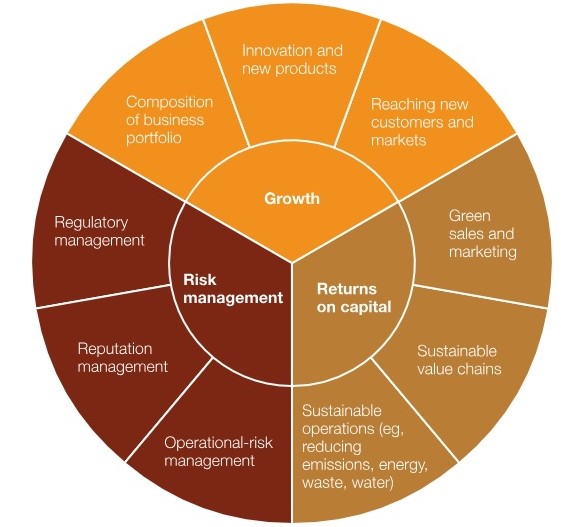Sustainability can lead to reduced energy costs to increased profits. This is how sustainability affects business.
Implementing sustainable strategies such as energy efficiency, waste reduction, sustainable supply chain management, water conservation, and renewable energy sources are just a few of the many options available for companies looking to reduce their carbon footprint while also improving profitability. By making small changes with these initiatives, businesses will reap big rewards in the future.
Sustainability is not only good for our planet but it’s essential for any successful business model. Investing in sustainability now will have long-term benefits on both your organization’s environmental performance as well as its financial success!
Let’s break down how sustainability affects businesses and their bottom line.
Table of Contents
Energy Efficiency
Energy efficiency is an important part of sustainability that can help businesses reduce costs and boost profits. Lower energy bills, improved operational efficiency, and reduced environmental impact are just some of the benefits of going green.
Lower energy bills can be achieved by reducing the amount of electricity used to power a business’s operations.
Improved operational efficiency comes from using less energy to achieve the same level of output as before, which leads to increased productivity and cost savings.
Finally, reducing environmental impact helps businesses meet their sustainability goals while also improving their public image with customers who value environmentally-friendly practices.
Cost savings from energy efficiency can come from reducing energy consumption, improving equipment performance, and implementing renewable energy sources. Reducing overall consumption involves making changes in how a business uses its resources such as setting up timers for air conditioning systems during peak hours when demand is highest.
Improving equipment performance means replacing old inefficient models with newer ones that are more efficient at converting electricity.
Implementing renewable sources like solar panels or wind turbines allows businesses to generate their own clean power without relying on traditional utility companies for expensive grid electricity prices.
An energy audit can identify areas where improvements could be made such as switching out light bulbs with LED alternatives or installing motion sensors so lights only turn on when someone enters the room.
Investing in efficient equipment ensures that all new purchases are designed to maximize resource usage while minimizing wastefulness. This includes everything from computers and office furniture down to kitchen appliances like refrigerators and coffeemakers.
Waste Reduction
Waste reduction is an important component of sustainability that can help businesses save money and increase profits. Benefits of waste reduction include cost savings from reduced waste disposal fees, improved resource utilization, and increased customer satisfaction.
Reducing the number of materials used in production processes can result in significant cost savings for a business. Reusing and recycling materials helps cut down costs while also reducing the environmental impact of manufacturing new products.
Conducting a waste audit is an effective way to identify areas where improvements can be made within a business’s operations. Developing a comprehensive plan for reducing waste generation should include setting goals, establishing metrics, tracking progress, and rewarding employees who are successful at achieving those goals.
Additionally, implementing employee training programs on proper recycling practices and encouraging staff participation in sustainability initiatives are both effective strategies for improving waste reduction efforts.
Sustainable Supply Chain Management
Cost savings from sustainable supply chain management is one of the ways how sustainability affects business.
For example, a business could save money by reducing the number of trips required for deliveries or switching to electric vehicles with lower emissions. Additionally, utilizing renewable energy sources such as solar power instead of fossil fuels can also lead to cost savings over time.
Strategies for implementing sustainable supply chain management include conducting a supply chain audit to identify areas where improvements can be made, developing partnerships with suppliers who are committed to sustainability practices, and creating a comprehensive plan for managing the entire supply chain process.
Businesses should strive towards improving their efficiency by focusing on processes such as inventory control and supplier selection. Companies should also ensure that all stakeholders involved in the production process adhere to ethical standards regarding labor rights and human rights so they can build trust with customers.
Water Conservation
Saving money and increasing profits through water conservation is another way how sustainability affects businesses.
The primary benefit of conserving water is the financial savings it provides for businesses. Companies that reduce their overall usage will see a decrease in their monthly utility bills, allowing them to reinvest those funds into other areas of the business.
Additionally, conserving resources also helps reduce environmental impacts associated with extracting and treating fresh sources of drinking water.
Furthermore, using less energy to treat and transport clean drinking supplies leads to fewer emissions released into the atmosphere – another benefit for both companies and the environment alike!
Businesses can realize significant cost savings by implementing strategies designed to conserve water resources within their operations. For example, installing low-flow toilets or showerheads reduces the amount of water needed per flush/shower cycle.
Additionally, investing in rainwater harvesting systems allows companies to capture precipitation runoff during storms instead of purchasing expensive treated municipal supplies.

(Source)
Renewable Energy Sources
Renewable energy sources include solar, wind, geothermal, hydroelectricity, biomass, and biofuels. These renewable resources can provide clean electricity with no emissions or pollutants.
Switching to renewable energy sources has many benefits.
- Reducing greenhouse gas emissions helps fight climate change.
- Providing a reliable source of power that is not subject to fluctuations in fuel prices.
- Creating jobs in the green economy.
- Protecting public health by reducing air pollution from burning fossil fuels.
Businesses can save money on their electricity bills by investing in renewable energy sources such as solar panels or wind turbines instead of relying solely on coal-fired plants or natural gas generators. The cost savings associated with using renewables depend largely on the location and size of the business but generally speaking it is possible to see significant reductions in monthly utility bills when switching to renewables.
Additionally, some governments offer incentives for businesses that invest in renewable energies such as tax credits or grants.
The first step towards implementing renewable energies into a business’s operations is conducting an assessment of current usage patterns. Research different types of technology available and look into government incentives offered for renewable energy investments.
Once this research has been completed then it becomes easier to determine what type of technology suits your company and which government incentive you can benefit from the most.
FAQs About How Sustainability Affects Business
How does sustainability benefit a business?
You can earn more money and boost your profits by implementing more eco-friendly business practices. Reducing your operating costs, coming up with more innovative ideas, improving your brand’s reputation, and attracting more customers who prefer green products all increase your earnings.
What are the effects of sustainability?
The benefits of sustainable business practices are far-reaching. In the business world, this encompasses everything from manufacturing and production to logistics and customer interaction.
Why do businesses want to be sustainable?
Businesses that adopt green practices can reap both financial and environmental benefits. Not only can they save money, but they can also improve their public image.
Conclusion
Energy efficiency, waste reduction, sustainable supply chain management, water conservation, and renewable energy sources allow corporations to reduce their carbon footprint while still achieving their financial goals. This is how sustainability affects businesses.
By making sustainability an integral part of their operations, companies can benefit from cost savings as well as increased customer loyalty and improved public image.
It is essential for business owners to be aware of the economic benefits of sustainability in order to make informed decisions about how they operate. The time has come for us to take actionable steps toward creating more sustainable workplaces!
{“@context”:”https:\/\/schema.org”,”@type”:”FAQPage”,”mainEntity”:[{“@type”:”Question”,”name”:”How does sustainability benefit a business?”,”acceptedAnswer”:{“@type”:”Answer”,”text”:”
You can earn more money and boost your profits by implementing more eco-friendly business practices. Reducing your operating costs, coming up with more innovative ideas, improving your brand\u2019s reputation, and attracting more customers who prefer green products all increase your earnings. “}},{“@type”:”Question”,”name”:”What are the effects of sustainability?”,”acceptedAnswer”:{“@type”:”Answer”,”text”:”
The benefits of sustainable business practices are far-reaching. In the business world, this encompasses everything from manufacturing and production to logistics and customer interaction. “}},{“@type”:”Question”,”name”:”Why do businesses want to be sustainable?”,”acceptedAnswer”:{“@type”:”Answer”,”text”:”
Businesses that adopt green practices can reap both financial and environmental benefits. Not only can they save money, but they can also improve their public image. “}}]}





